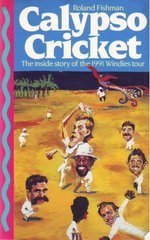Calypso Cricket: The Inside Story of the 1991 Windies Tour
Stuart Wark |Published: 1991
Pages: 296
Author: Fishman, Roland
Publisher: Penguin
Rating: 1.5 stars

As part of the ongoing commitment to quality assurance, the CricketWeb Team conduct a regular analysis of what books have been reviewed and the allocated ratings. Our most recent audit revealed a clear trend: we are tending to only review “good” books. There is no disputing the fact that our average rating has gone up over the past few years. A long debate ensued regarding why this situation would have happened. Initially, it was argued that simply the quality of books was greater now than it has been in the past. However, it was finally time to accept the hard truth that, as a review team, we are dropping the ball by ignoring the less well-written or poorly researched works. After much more discussion, it was agreed by the rest of the team that I would need to rectify this situation (and make up for my own lack of recent outputs) by reviewing the worst cricket book of all time.
Hello, Calypso Cricket by Roland Fishman.
Calypso Cricket was released following the Australian cricket team’s 1991 tour of the West Indies. Fishman had previously released a cricket book entitled Greg Matthews: The Spirit of Modern Cricket, and he clearly had some form of established relationship with Matthews who was in the touring party. The nature of this relationship is somewhat unclear, as Fishman implied they were almost best friends, but Matthews afterwards presented a very different viewpoint. Nonetheless, Fishman used this linkage to gain some level of access to the Australian team during their time in the Caribbean.
The focus of the book often appeared to be more about the author than the supposed subject, and how he tried to establish a personal relationship with the players on tour. While there were some attempts to “intellectualise” the work through references to philosophers such as Nietzsche, these came across as mere sophistry rather than a genuine attempt to analyse the sociological aspects of the cricketers’ touring life. Fishman does not seem to have any real knowledge or interest in the actual cricket matches, and therefore spends more time concentrating on less salubrious topics more worthy of a shabby tabloid newspaper. Upon release there was a considerable media storm surrounding the “revelations” of off-field misbehaviour.
There are some minor redeeming points to this book, and, in fairness to the author, it is quite well written and can be entertaining in a slightly “guilty pleasure” sort of way. Some of the sections around the players are interesting, but I remain somewhat sceptical about the impartiality of these profiles. For me, the book fails primarily because it is never entirely clear what it is trying to achieve. There appears to be a lack of clarity around its target audience, and it therefore doesn’t seem to hit the mark with any of them. One of the other reviewers on the team does not agree with me about this being the worst cricket book of all-time, and he professed that he actually quite liked it. So it is merely my opinion, but I have issued the challenge for him to review a worse one. And, before it is nominated, Greg Matthews: The Spirit of Modern Cricket is not eligible.
I find it very interesting that one of Fishman’s next books was nothing to do with sport, but still everything to do with Calypso Cricket. It was titled Creative Wisdom for Writers, and the blurb describes it as a book that “will inspire writers to reach their potential, trust and have faith in their craft, and stimulate their imaginations.” I cannot help think that Fishman’s imagination does not need any additional stimulation, but he may well be an ideal mentor for individual’s struggling in this department.
If Calypso Cricket had been released as a work of fiction, I actually think it would have worked better as Fishman does show some skill as an author. However it is my view that, unfortunately, this book simply does not work as published.
On a positive note to finish with; it was agreed that this review was sufficient to redress our recent overly exuberant scoring, and therefore the recent status quo should resume next week.






Leave a comment